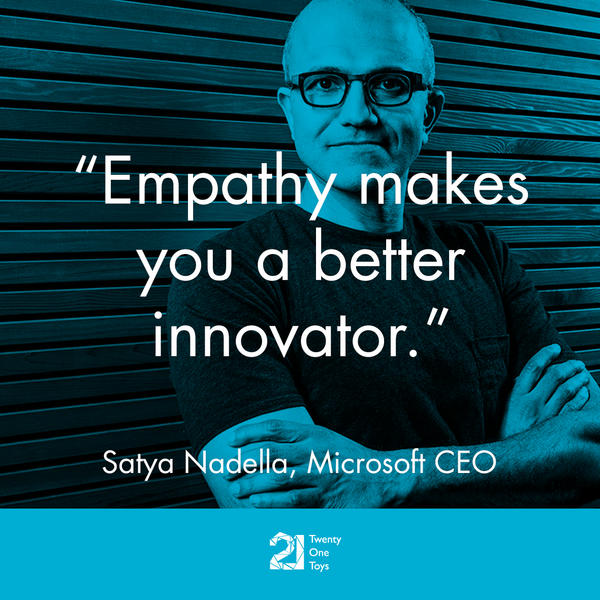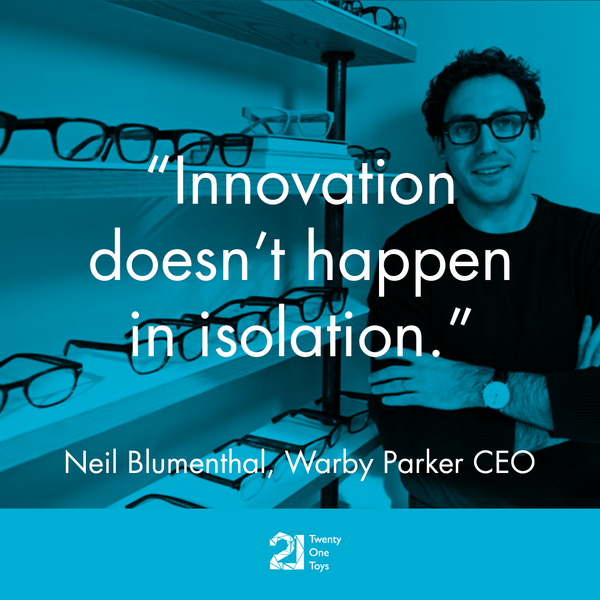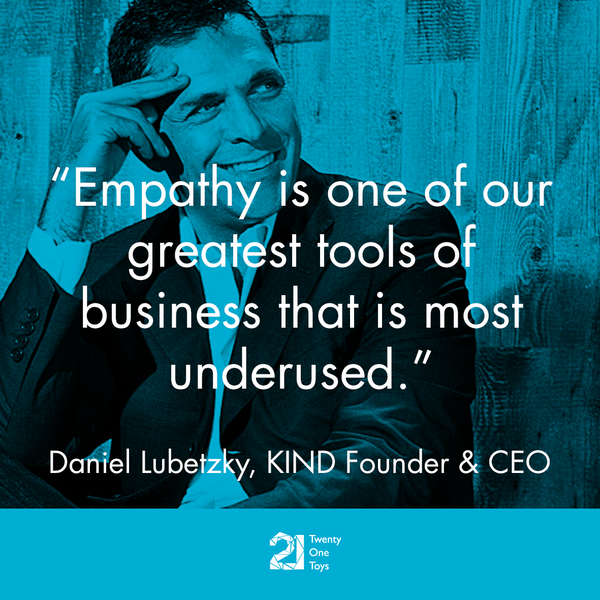As the seasons change, one thing remains invariable — another CEO is speaking out about the value of empathy in business and beyond. This time it’s Microsoft CEO Satya Nadella, as he promotes his newly-released book entitled, “Hit Refresh: The Quest to Rediscover Microsoft's Soul and Imagine a Better Future for Everyone.”
Empathy at the heart of life, work, and society
Considering the hybrid memoir-meets-business-management style of the new text from Microsoft’s CEO, it’s hardly surprising to see coverage in TIME, Fortune, and NPR focus on insights from Nadella’s personal life that he has successfully applied to the world of work.
In an increasingly interconnected society, it’s not hard to see how work and life are complementary: individual change leads to organizational change, which in turn can lead to powerful change in the world at large. This CEO has taken lessons from his life to focus on empathy at home, cultivate empathy at work, and ultimately to harness empathy to make a difference in society.
That ultimate goal of social impact, is underscored when Satya Nadella reflects on “the power of taking everyday action driven by empathy:
“It’s a quality my wife, Anu, helped me begin to learn when our son was born with severe disabilities 21 years ago. It’s a quality that shapes our mission of empowerment at Microsoft and our quest to meet unmet and unarticulated needs of customers. And it’s the quality that helps us as a society move forward in creating new opportunity for all.”
– Satya Nadella, Writing “Hit Refresh”
Knowing this, it’s easy to see why Satya Nadella starts off our list of 3 CEOs using empathy to unlock innovation:
-
Microsoft CEO, Satya Nadella
 (Microsoft CEO Satya Nadella Says Empathy Makes You a Better Innovator)
(Microsoft CEO Satya Nadella Says Empathy Makes You a Better Innovator)You’d be hard-pressed to find someone entirely unfamiliar with Microsoft – the computing company founded in 1975 and called out by Fast Company as one of the most innovative companies of 2017. From the Windows operating system powering the vast majority of PCs, to the Microsoft Office suite of software like Word and PowerPoint, Microsoft’s impact on the world of work to date is legendary. With three years under his belt as CEO of Microsoft, Nadella is reshaping the world of work by shifting the focus at Microsoft to start with empathy.
Nadella understands that innovation isn’t just about challenging the status quo – it means listening to your customers and understanding their needs. Innovation is a result of having at heart the best interests of the people you serve. Nadella makes that clear when he puts it this way:
“Empathy makes you a better innovator. If I look at the most successful products we [at Microsoft] have created, it comes with that ability to meet the unmet, unarticulated needs of customers.”
— Satya Nadella, Microsoft CEO Satya Nadella Says Empathy Makes You a Better InnovatorAnd that’s not just the hunch of one CEO at one major company. The Global Empathy Index, spearheaded by Lady Geek founder, Belinda Parmar, is an initiative that relies on data to validate the importance of empathy in business. Within the yearly index, companies are ranked not by an empty public commitment to empathy, but by measuring tangible indicators — from employee opinions to environmental practices. And the results show a “direct link between empathy and commercial success." It’s no wonder then, that leaders like Nadella are eager to put empathy at work at the heart of their business:
“My passion is to put empathy at the center of everything I pursue — from the products we launch, to the new markets we enter, to the employees, customers and partners we work with.”
— Satya Nadella, Jagler: Empathy drives Satya Nadella as Microsoft CEO -
Warby Parker CEO, Neil Blumenthal
 (Warby Parker Co-Founder On the Next Generation of Social Entrepreneurship)
(Warby Parker Co-Founder On the Next Generation of Social Entrepreneurship)As a venture launched in 2010 by four University students, Warby Parker is no stranger to innovation. The team of four co-founders disrupted the prescription eyewear industry when they defied common convention and made buying affordable glasses online a new reality.
Interestingly enough, Warby Parker boasts not just four co-founders but two CEOs, mirroring a growing trend of collaboration even at the highest organizational level. Taking cues from “collective management traditions” in countries like Germany, dual CEOs run companies like Chipotle and Whole Foods, while Samsung is guided by a trio of Chief Executive Officers.
Commanding a company built on the collaboration of friends, Warby Parker’s co-CEO Neil Blumenthal understands the value that multiple leaders bring to the table through different strengths and perspectives. Early on, the team at Warby Parker committed to a culture of feedback where communication is open and honest. A culture where leaders are unlikely to deliver top-down marching orders from judgments formed in isolation. Because, as the co-founder and co-CEO puts it, "arrogance and entitlement impede innovation."
Unlock innovation at your company by developing empathy in your team
Book an Empathy Toy workshop today
Learn MoreIt’s clear then that the eyewear CEO understands the importance of seeing things from another person’s perspective. In an editorial published by Inc, Neil Blumenthal tells a story from his early days as the Director of VisionSpring – the non-profit on a mission to “ensure that everyone in the developing world has access to eyeglasses,“ and a beneficiary of the Warby Parker “Buy a Pair, Give a Pair” initiative that’s distributed over 3 million pairs of glasses in the developing world.
“I would be in a village in rural Bangladesh, with a community of weavers. I knew they had vision problems, but not one was wearing glasses. I would say, 'Raise your hand if you have trouble seeing.' No one would raise their hand.
So I said, 'Raise your hand if you have trouble threading a needle.' And everybody would raise their hand.”
– Neil Blumenthal, Warby Parker CEO: Why Empathy MattersFrom this story Blumenthal recognizes, “You have to know the right question.” That means checking your arrogance, and not assuming that you have the right answer – or are even starting with the right question.
That commitment to empathy, to understanding the needs of others, is not limited to the product-development side of business, where your aim is to help a customer or client. It also means employees caring about each other, and collaborating better because of that. Blumenthal understands how empathy builds better teams when he says, “I want our managers to care deeply about the people who work for them, to know a lot about each person individually and what motivates them.”
-
KIND Founder and CEO, Daniel Lubetzky
 (5 Business Lessons from KIND Founder and CEO Daniel Lubetzky)
(5 Business Lessons from KIND Founder and CEO Daniel Lubetzky)Founded in 2004, KIND is a healthy-snack company on a mission to empower consumers to do the “kind thing”. That means doing the “kind thing” for your body by fuelling it with natural whole-foods, and doing the “kind thing” for your community through spreading kindness and empathy.
For KIND founder and CEO, Daniel Lubetzky, doing the kind thing transpires on a much greater scale. The serial entrepreneur – whose past ventures include a company that brought together neighbours in conflict regions to make and sell food products in the Middle East – is known as much for his grand gestures as for his small acts of kindness.
Earlier this year he pledged $25 million to fund an advocacy group called Feed The Truth – an independent organization with an aim to improve public health, created in response to food-sector special-interest groups that value profit over consumer health.
But for Daniel Lubetzky, doing the kind thing isn’t just the right thing to do – it’s the smart thing from a business perspective.
“What’s interesting is that as my thinking has evolved – I’m on my fourth business now – it has become clearer that empathy and kindness offer a distinct competitive advantage. When I understand people with ease, I can accomplish more in both my business and my private life. Being able to access these skills is especially valuable in those moments when you feel threatened and your fight/flight instinct kicks in. If you can ask yourself questions like, “where is this person coming from?” then you’re able to get to a more productive place quicker, thereby creating value for business and society.”
— Daniel Lubetzky, Meet The CEO Who Is Championing Kindness And Whose Company Runs On ItSometimes it takes a someone at the helm of an entire company to see the big picture and how it all connects. Empathy isn’t just about better understanding person-to-person, and it’s not just about doing what’s good for business. It’s also about the kind of holistic vision we so often look to CEOs for – making the world a better place. Lubetzky perfectly sums this up when he says,
“For me, empathy is an existential question – it’s about the survival of the human race. That is, it’s imperative for us to overcome the challenges we face. Unless we can join forces and recognize each other’s humanity, how can we do business together, let alone make progress on the increasingly complex and difficult problems in society?”
— Daniel Lubetzky, Meet The CEO Who Is Championing Kindness And Whose Company Runs On It
What do you think? Let us know on twitter or send us a message!



